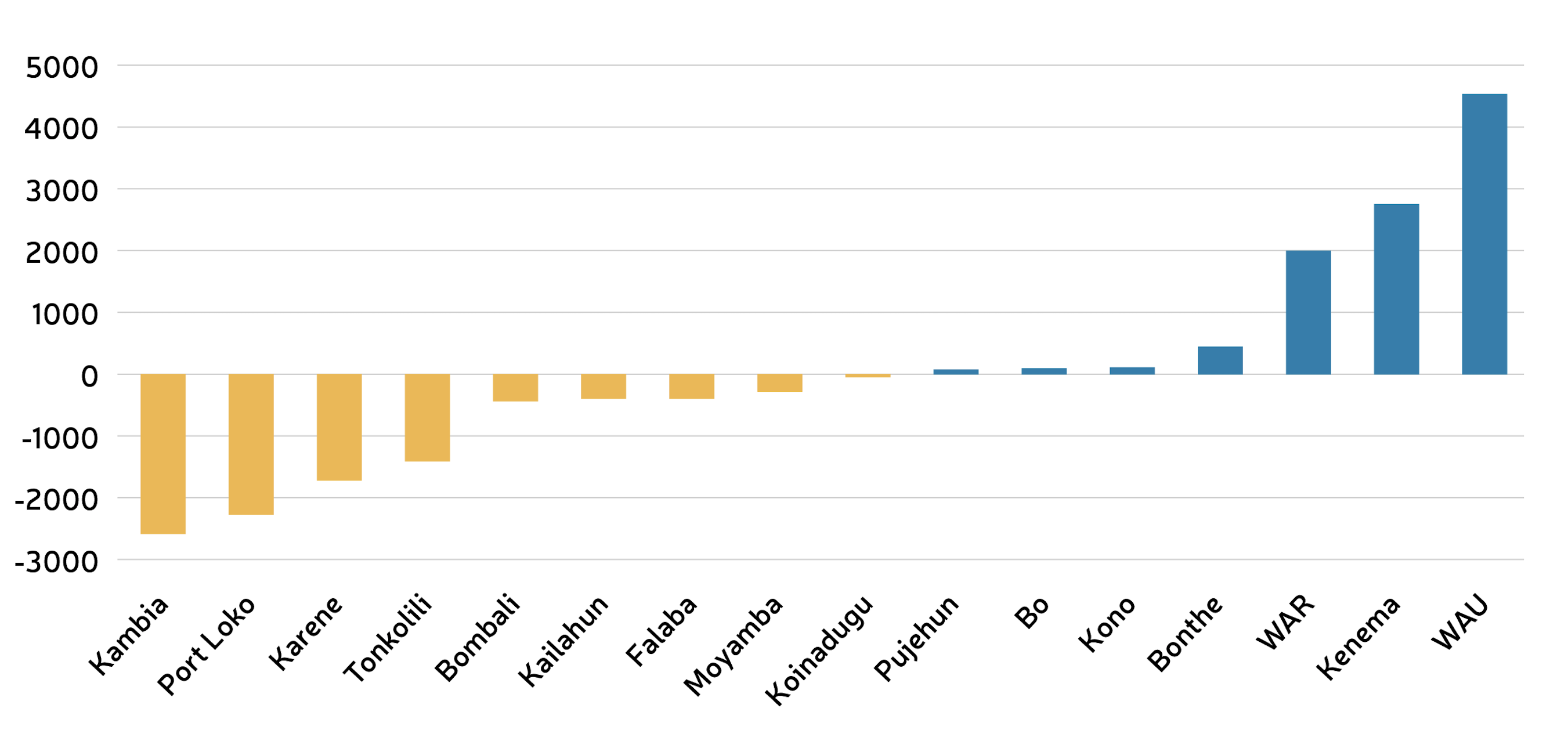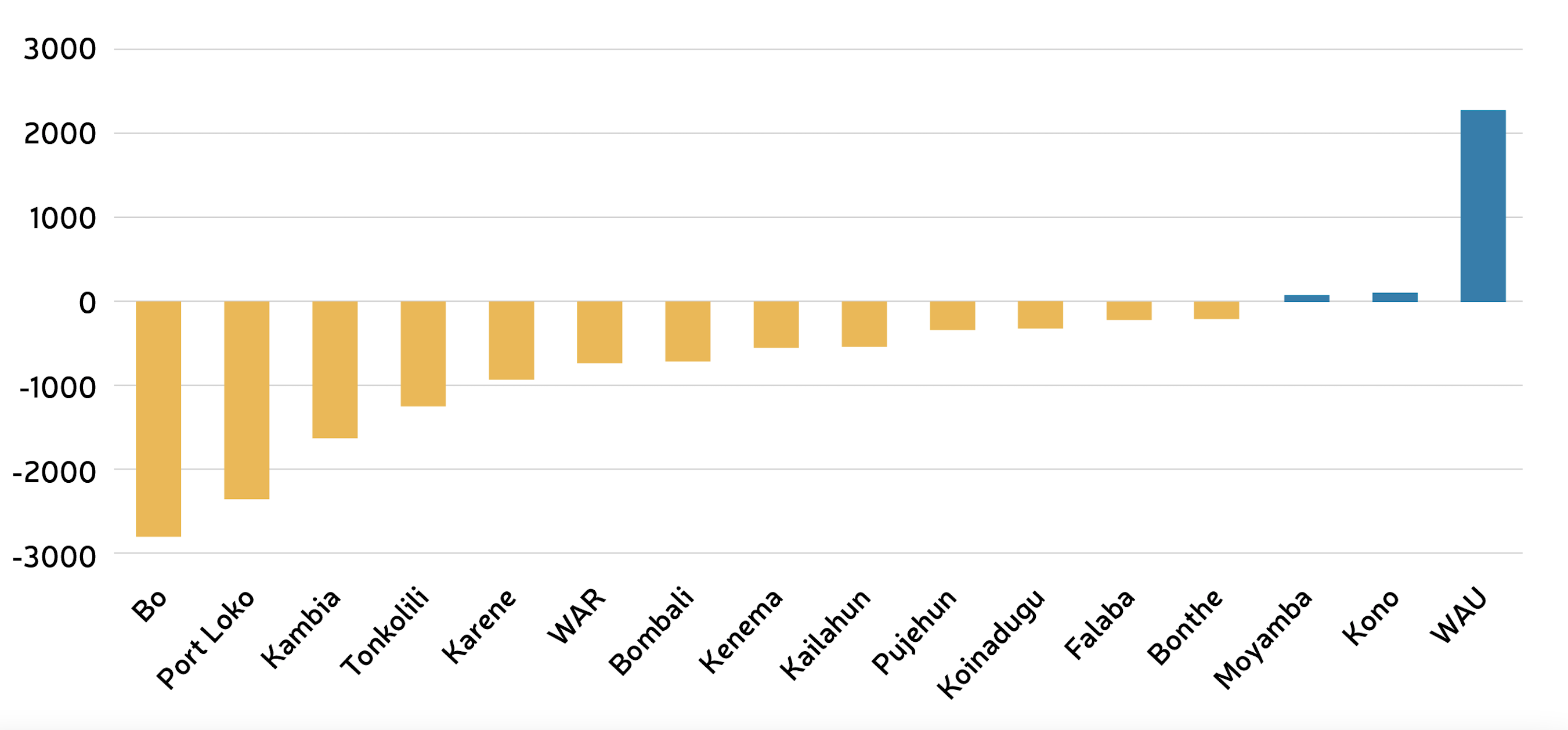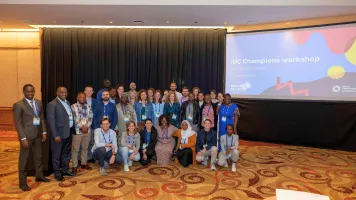The COVID-19 pandemic has underlined the universal importance of inclusive and quality education. When children are denied access to schools, their well-being worsens, women are forced out of the workforce, and economies falter. The impact of school closures often affects girls more severely, with increased risks of sexual violence, exploitation, and pregnancy––as Sierra Leone saw during the Ebola crisis.
“Sierra Leone is no stranger to dealing with viruses. The lessons learnt during the deadly 2014 Ebola crisis helped the country address the current education challenges more effectively. This time around, the virus has enabled us to think further about how to do things differently, particularly for children who have been adversely affected, starting with building a more inclusive and equitable education system. It inspired much of the direction and content in our new inclusive education policy, validated by education stakeholders and approved by the Cabinet of Sierra Leone.”
––Dr David Moinina Sengeh, Minister of Basic and Senior Secondary Education of Sierra Leone
Unlocking the transformative power of education to shift people out of poverty and reduce inequalities requires an education system that is inclusive and accessible to all. In 2019, Sierra Leone’s Ministry of Basic and Senior Secondary Education (MBSSE) became a Champion of the Inclusive Data Charter (IDC), which catalyzes and supports action on inclusive and disaggregated data to ensure that no one is left behind. As an IDC Champion, MBSSE committed to generating high-quality, disaggregated education data, especially on girls and children with disabilities, and using this data to build a more inclusive and equitable education system.
What were the inclusive education data challenges in Sierra Leone?
In 2018, the Global Partnership for Sustainable Development Data (Global Partnership) began exploring the potential to strengthen the national data systems’ inclusivity with Sierra Leone’s Open Data Council (ODC).
Before then, collecting and using inclusive education data in Sierra Leone was challenging. Education data collection processes were rudimentary, often relying on paper-based questionnaires and rarely capturing data that could be disaggregated by gender or disability. Limited alignment on data systems and processes within MBSSE led to data scattered across many agencies and institutions without a central analysis hub. This meant that critical education data was difficult to compile. For example, there was not a comprehensive picture of the number of classrooms and teachers in the country.
Understanding which students are being excluded from education and unraveling the reasons for their exclusion requires accurate, inclusive data. This was particularly challenging when it came to girls’ education. For example, stigma, discrimination, and the lack of adequate support mechanisms were barriers for pregnant girls to finish their education until the lifting of the ban in 2020. This is why a key priority for MBSSE’s new radical inclusion policy is identifying girls who are at risk of being left behind and improving their access to education.
What actions were taken to address the challenges?
Working with the Global Partnership and the Open Data Council, MBSSE took three main actions across 2018-19 to advance their commitment to generating better quality education data:
1. Consulting with government institutions and organizations to strengthen alignment and coordination on education data. By hearing directly from various global and national stakeholders including civil society and community-based organizations, MBSSE developed a clearer understanding of the most pressing data gaps and identified specific opportunities to address them. Alongside these stakeholders, the Global Partnership was pivotal to generating and sustaining the political will needed to advance more inclusive education data.
2. Establishing a multi-stakeholder education data collaborative. To create a more comprehensive national data set, data from different partners was needed to support baseline data from the Education Management Information System. As a result, the Education Data Collaborative was established to build the foundations for a more sustainable, systemic approach to collaboration, coordination, and data sharing between the different stakeholders working in education.
As part of the Collaborative, five task teams were established to lead on key thematic issues and coordinate specific deliverables. They focused on the following:
- Data governance and management
- Innovations
- Education policy and strategy integration
- Financing and sustainability
- Advocacy and communication
3. Strengthening commitment to inclusive data by signing up to be an IDC Champion. The five principles of the IDC informed the mandate and inclusive approach of the Education Data Collaborative. The Collaborative’s task team on data governance supported the development of MBSSE’s IDC action plan, including developing a process to monitor, evolve, and report on the performance of the plan over time. Members of the data governance task team included government, private sector, multilaterals, and civil society organizations. MBSSE appointed an IDC Champion focal point to embed the action plan priorities within the work of the broader education data collaborative.
“To demonstrate the value of inclusive data, we agreed to focus efforts on a specific sector, scaling up the learnings to broader government institutions over time. As inclusive education was a political priority, the Global Partnership and the ODC began working with diverse stakeholders across the education sector under the leadership of MBSSE. Together, we explored how to increase the inclusivity of education data. Given the focus on data disaggregation, signing up to the IDC was identified as a mechanism that could further support MBSSE’s efforts.”
––Victor Ohuruogu, Senior Africa Program Manager at the Global Partnership
What has been the impact of strengthening inclusive education data?
The Education Data Collaborative increased momentum and political support for inclusive data by bringing together government institutions, organizations including UN agencies, civil society organizations, and representatives from marginalized communities to develop an IDC action plan. The Collaborative stakeholders collectively advocated for and supported a review of the instruments and survey tools used for data collection during the 2019 education census. As a result, additional questions on disability and gender were included in the census for the first time.
One of MBSSE's IDC commitments is to strengthen collaboration and coordination with key national partners, such as Statistics Sierra Leone and National Civil Registration Authority. Both have been part of the annual school census, helping to shape the design of the questionnaires being used and involved in the data collection processes as supervisors.
Since 2019, MBSSE has continued to focus on strengthening inclusive data, introducing digital data collection technologies in schools and including more questions to understand marginalized people’s access and inclusion in education through national surveys and annual school censuses. Using more inclusive, reliable, and granular data, MBSSE has worked across the government to design policies and campaigns to drive better access to quality education.
To advance the Free Quality School Education program, which aims to increase nationwide access to quality education, MBSSE is prioritizing radical inclusion as the guiding vision of their work. Inclusive data is integral to the new National Policy for Radical Inclusion in Schools. MBSSE believes that it is essential that the information they collect to guide their decision-making is inclusive of all children and disaggregated so that all citizens can access quality education and that no one is left behind. The radical inclusion policy has been printed in braille and disseminated to schools for the blind.
What is radical inclusion?
The National Policy on Radical Inclusion in schools is the first attempt by any government in Sierra Leone to provide a roadmap for the day-to-day operations of schools to ensure inclusion and positive experiences for all students regardless of their status in society. The policy emphasizes the inclusion of historically marginalized groups: pregnant girls and parent learners, children with disabilities, children from rural and underserved areas, and children from low-income families. It provides guidelines for decision-making and streamlining processes so that schools throughout Sierra Leone are accessible to and inclusive of all children without stigma, harassment, intolerance, and exclusion of any kind.
“Radical inclusion is the intentional inclusion of persons directly or indirectly excluded (from education) due to actions or inactions by individuals, society or institutions. Sometimes silence excludes, or infrastructure excludes; sometimes intentional actions exclude. Radical inclusion means that these silent exclusionary policies, moral stances, formally stated actions, institutional regulations, national laws, and systemic frameworks should be removed intentionally and with urgency to achieve inclusion.”
––Dr. David Sengeh, Minister of Basic and Senior Secondary Education
MBSSE has made progress on their commitment to increase girls’ access to education, including overturning the ban on pregnant girls from attending school. The 2019 education census revealed that Port Loko, the second most populous district in Sierra Leone situated in the northern region, had one of the highest teenage pregnancy rates and no girls’ schools. As MBSSE began disaggregating the data further by characteristics such as district and gender, they were able to see the value of a girl’s junior secondary school in Port Loko.
The census data showed that, in each class of junior secondary school and senior secondary school in Port Loko, there were less females enrolled than males in both 2018 and 2019 (see Figures 1 and 2). MBSSE further compared male and female enrolment with each of the country’s 16 districts. Porto Loko was found to have one of the highest differences between male and female enrollment in comparison to other districts. Possible factors that account for this include higher likelihood for girls to drop out of school early due to teen pregnancies and economic drivers, which lead to some parents prioritizing and valuing the education of boys over girls.
The charts below show the difference between male and female enrollment in each of the 16 districts. A positive figure (blue bar) represents more females than males, and a negative figure (yellow bar) represents fewer females than males.
Figure 1: 2019 junior secondary school enrolment in Sierra Leone’s 16 districts, showing the variance between male and female enrolment.

The variance between male and female enrollment increases at the senior secondary school level
Figure 2: 2019 senior secondary school enrollment in Sierra Leone’s 16 districts, showing the variance between male and female enrollment.

Using the data insights MBSSE decided to build a girls’ junior secondary school and in late 2020 opened the first ever Learn, Act, Build (LAB) school in the country in Porto Loko, as there were no girls’ schools there. The girls’ LAB School is a center of excellence for learning and teaching innovation and aims to develop, test, and evaluate evidence-based learning and teaching methods in collaboration with students, educators, parents, and policymakers, with best practices scaled up across Sierra Leone’s public education system.
Conclusion
MBSSE plans to build on the progress to date by further strengthening the quality of education data and consolidating it into one portal. By continuing to put data at the heart of decision-making, MBSSE seeks to ensure schools are a place of dignity, safety, and respect for all, and barriers to education are systematically addressed. MBSSE continues to use IDC principles as guidelines to inform decision-making.
There is potential to scale up MBSSE’s multi-stakeholder collaborative approach to strengthening data systems at the national level––by working with other line ministries looking to address similar gaps and challenges.
“We can build on the progress and gains that have been made by MBSSE by exploring ways to roll out similar collaboratives across other sectoral-level ministries to fulfill Sierra Leone’s medium-term national development plan. The IDC and its principles can be a mechanism to support those efforts, enabling us to build more consensus, buy-in, and ownership on inclusive data by bringing in perspectives from stakeholders at political, local, and community level to inform longer term planning and action to leave no one behind.”
––Yeama Thompson, IDC National Level Coordinator and ODC Chair.

